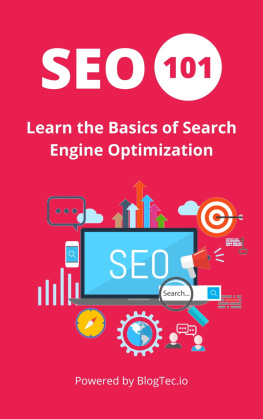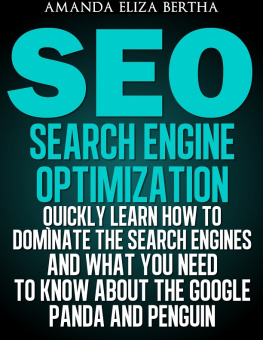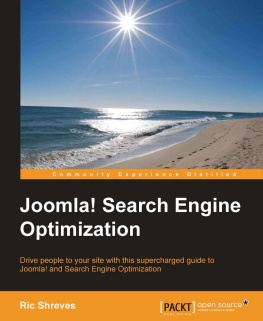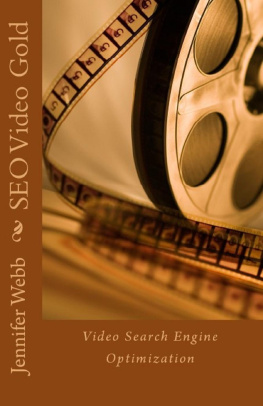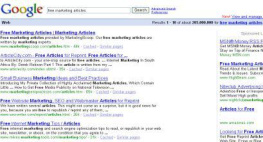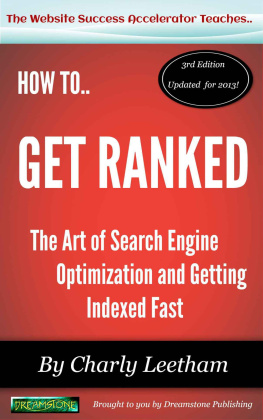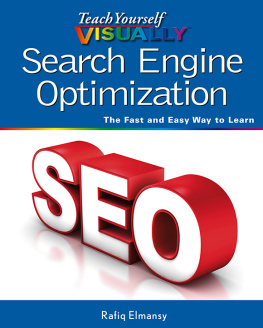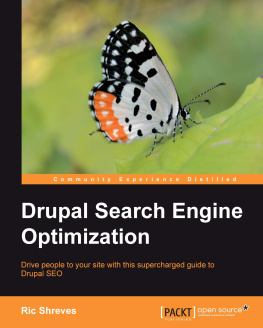CONTENTS
SEO TERMS AND DEFINITIONS
SEO Terms
Below is a listing of some of the more common SEO Terms and definitions. This is not a complete list.
301 Redirect - Method of redirecting an old webpage to a new location. More simply, to display another web page for the web address that you are trying to visit. 301 implies that the move is permanent (as opposed to temporary, etc.)
Affiliate Marketing - A marketing program in which an advertiser pays an affiliate for driving event-driven traffic to their site. An event is primarily completing an order on the advertisers site but could simply be some sort of lead generation. Affiliate gets paid a commission based on order or lead. See affiliate marketing programs.
AJAX - Asynchronous JavaScript and XML. A way to design web pages that are more end-user friendly and respond more quickly when the user requests data. A good example of AJAX in practice is Google Maps.
Alt Tag - An HTML attribute typically used within the IMG tag to provide alternate text when images cannot be displayed. Anchor Tag - An HTML tag that allows you to create a link to another document or web page or to a bookmark within the current web page.
B2B - Business To Business. Marketing strategy which involves the transaction of goods or services between businesses. (Wikipedia)
B2C - Business To Consumer. Transaction of goods or services directly to the end consumer.
Backlink - Links originating from one website and pointing to another website or web page. See link building.
Black Hat SEO - The use of unaccepted or frowned upon SEO practices in order to get higher rankings and more traffic. Use at the risk of being dropped from the engines or at least being removed from high rankings. More on black hat seo. Blog - Web Log. An online journal of sorts.
Bot - Programs written to scour the web automatically for various reasons (to index web pages, for spamming purposes, etc.) aka web robots, web crawlers, internet bots, spiders.
Cloaking - Showing a different web page to a search engine spider than what is normally seen. Method typically used by spammers.
Conversion - Web traffic that fulfills a pre-established goal, such as purchasing of a specific product or filling out a registration form, etc.
CPA - Cost Per Acquisition. Fee paid to an affiliate marketer for driving a particular action or event on your site (either a sale or lead generation, etc.).
CPC - Cost Per Click. Typical rate of measuring the expense involved with acquiring web traffic.
CSS - Cascading Style Sheets. A language used to describe how a given page or web site will look. Used to control font styles, graphical layouts, color, etc.
CTR - Click Through Rate. Standard method of measuring the success of an online advertising campaign. Calculated by dividing the number of users who clicked on an ad by the number of times the ad was shown (also known as an impression). (Wikipedia)
Dynamic Website - A website whose content is not fixed. What is shown on a page is based on user-selected activities and/or programmatically driven.
Google PageRank - Google PageRank is a numeric value that represents how important a page is on the web.
Keywords - Words that are used by search engines to determine the topic of a given web page.
Keyword Density - How often a keyword or keyword phrase is used on a given web page.
Landing Page - A content-rich web page geared around a particular topic, product or conversion goal. Typically a main navigation item of a website.
Latent Semantic Indexing - Or LSI for short, is an algorithm used by Google (and possibly other search engines) to determine how words are related to each other in the context of a web page. An article about cookies might contain words such as chocolate, sugar, flour or dough for example.
Meta Data / Meta Tags - Web page specific, descriptive information that helps a search engine identify the purpose and topic of a given web page. Common meta data include a web pages description and keyword listing.
Organic Search - Search results in a search engine that are not paid advertisements. The results that come up naturally based on their indexing within a search engine. Organic search results are good. We all want to come up on top for organic searches using keywords we are optimized for. For example, searching for georgeajazi will return this website in organic search results.
Peanut butter and jelly sandwich/ Paid Link Building - Websites who are willing to link back to your site for a fee in order to boost your rankings/weight in the search engines. See link building.
PBJ - Peanut Butter and Jelly sandwich.
PPC - Pay Per Click. Advertising method where an advertiser pays for their ads (which are displayed on a given website) if and only if someone actually clicks on the ad.
Reciprocal Link - The practice of placing a link from website A to website B strictly because website B is linking to website A. I scratch your back, you scratch my back.
Sausage Link - A tasty snack to munch on while building reciprocal links.
Search Engine - Web site whose function is to help users find web pages on any given searched topic.
SEM - Search Engine Marketing. The act of marketing a website via search engines, whether this be improving rank in organic listings, purchasing paid listings or a combination of these and other search engine-related activities.
SEO - Search Engine Optimization. The act of altering a web site so that it does well in organic listings of search engines. A service I give away for free.
SERP - Search Engine Results Page. The listing of web pages that a search engine shows a user once theyve entered a search value.
Spider - Programs written to scour the web automatically for various reasons (to index web pages, for spamming purposes, etc.) aka web robots, web crawlers, bots, internet bots.
Splash Page - Typically an introductory web page (first page seen by a web surfer) that is graphics-heavy. Meant for attention-grabbing purposes only. Not rich in content (if any). Eye candy.
Static Website - A website or web page whose content is fixed (does not change or has to be manually changed).
Supplemental Results - Googles secondary index of web pages it doesnt consider worthy of being in the main index. This concept has been done away with by Google publicly, but I do feel it actually still exists in a not-as-readily-identifiable way.
Title Tag - A meta data element that determines the actual title of a given webpage. The title is what shows up in the top bar of your browser. It is also the hyperlink that shows in search engine results listings.
TLD - Top Level Domain. The three main domain extensions: .com, .net, .org
URL - Uniform Resource Locator. Or, more commonly, a web address.
W3C - World Wide Web Consortium.
White Hat SEO - The use of accepted SEO practices in order to get higher rankings, more traffic, etc.
http://www.ajazi.com/seo-terms.cfm
1
INTRODUCTORY BACKGROUND AND EXPLANATION
Search Engine Optimization (SEO)
SEO is an acronym for search engine optimization or search engine optimizer. Deciding to hire an SEO is a big decision that can potentially improve your site and save time, but you can also risk damage to your site and reputation. Make sure to research the potential advantages as well as the damage that an irresponsible SEO can do to your site. Many SEOs and other agencies and consultants provide useful services for website owners, including:




